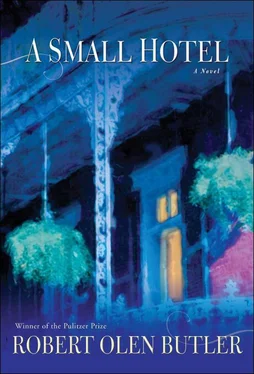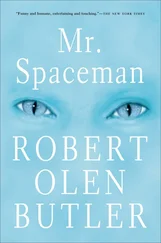Robert Olen Butler
A Small Hotel
For my agent and friend, Warren Frazier
I offer my sincere thanks to the folks at both the Olivier House Hotel and Oak Alley Plantation for their kind assistance in my preparations for this book. These have long been two of my favorite places in the New Orleans area, for their history and for their aesthetics and for the intelligence, helpfulness and downright charm of the staffs. Needless to say, any characters in this novel associated with those two places are strictly fictional, products of the artistic necessities of the book, and have no real-life counterparts.
On the afternoon of the day when she fails to show up in a judge’s chambers in Pensacola to finalize her divorce, Kelly Hays swerves her basic-black Mercedes into the valet spot and thumps hard into the curb and pops the gearshift into park, and then she feels a silence rush through her chest and limbs and mind that should terrify her. But she yields herself to it. She brings her face forward and lays her forehead gently against the steering wheel. She sits in front of the Olivier House on Toulouse Street in the New Orleans French Quarter, a hotel she knows quite well. Like this present silence overcoming the welter in her, before she stepped from her house in Pensacola a little over three hours ago she yanked her hair back into a ponytail and simply stroked a hasty touch of lipstick onto her lips but she then was moved to put on her favorite little black dress, a sleeveless sheath, a prêt-à-porter Chanel she’d had for years, put it on slowly in the muffled silence of her walk-in closet, listening to the Chanel’s faint rustle going over her, letting the silk lick her down the thighs. She turned forty-nine years old two months ago on her deck, alone with a single-malt, looking out at the Bayou Texar going dark in the twilight. She wore makeup that night, for herself, prompted by the Scotch, and she wore her hair in a French twist, and she knew, in spite of everything, that she looked thirty-something, even early-thirty-something. And she knows now that she looks all of forty-nine. All and more as the door to her car opens and she lifts her face to a gaunt, long-jawed, middle-aged man, a man she recognizes.
He recognizes her, too. “Ah,” he says. “Welcome back, Mrs …” and he snags on her name, even as she forces her body to turn, forces her feet to the pavement outside, and she rises from the seat.
She sees him duck a little, to check out the passenger side of the car. He is looking for her husband.
“If you can just take care of the car,” she says, wanting only to stop any small talk, wanting only to close the door behind her in her room.
“I’m sorry,” the man says. “I used to be better at names.”
“Beau, isn’t it?”
“Beau. Yes. Thanks for remembering. I used to be better at that.” And he steps to the rear of the car, seeing her small Gucci upright bag lying in the back seat. He reaches for the door handle.
“Beau,” Kelly says, firmly, “I can handle my bag. Just do the car.”
Beau withdraws his hand. “The car,” he says. “Sure.”
“I’m sorry,” Kelly says. “Hays.”
“Mrs. Hays,” Beau says, brightening. “Of course. Glad to have you back.”
And now she stops on the sidewalk before the door to the hotel, and she lets go of the handle of her rolling bag. She can turn and stop Beau, who has only this moment closed the driver door of the car, she can stop him and she can get back into her car and drive away. Ah, but to where. To the house. To Hell with the house. She doesn’t want the house. Someone laughs down the street.
She turns to look. It is a small sound from this distance, but she heard it clearly. A young man and a young woman lean into each other at the door of a bar at the corner of Bourbon Street. She knows the bar, too. The young couple in this moment and perhaps the bar twenty-five years ago and half a dozen times since: these are things she can consider. But nothing else for now. The rest is carefully put away. The rest is inside the bag, whose handle she now grasps. She will go in. And she does. She goes up the steps and through the door into the Olivier House, an early nineteenth-century townhouse with a Federal façade of plastered brick and a labyrinthine Creole inner life with loggias and two courtyards and slave quarters and four floors of galleried rooms.
And she is at the end of the entrance hall, near the parlor door, and she is glad the young man at the desk is a stranger and she has her key and is through the double doors behind him and crossing a small flag-stone courtyard rimmed in banana trees and fig trees and she is through a low, curving loggia and into the larger courtyard with the swimming pool, but she turns at once up a staircase and she climbs one floor and another and she is breathless now, not from the climb but from the room before her.
Room 303. Two narrow black doors, each with three stacked panes of glass: fully half the doors are glass, and it surprises her; this is a thing she should remember well but she doesn’t. The doors are hung with white ruffled curtains, and her hand jitters the key against the lock, unable to get it into the hole. She stops. She lowers her hand. She wants in badly, wants into this room that she came to feel was her own place in the Quarter. No. She always felt it was their place. But hers now. Entirely hers. And she wants in so badly that she cannot get in, from the very wanting of it. She breathes deeply. She raises her hand again and focuses on keeping it steady, and at last the key slips into the lock and the door is opening and she is inside and the door shuts behind her. She lets go of her bag. She closes her eyes.
The smell of the place is always the same. Old wood and old rugs and fresh sheets and from the open balcony doors the sweet but tainted smell of the Quarter, jasmine and roux and shellfish brine, beer and piss and mildew, and something of the river too, and the swamp, and a hard rain that passed by, and ozone and coffee and sex, Michael’s smells and her smells: can all of this be inside her in this room in this moment? Probably. She is weeping.
∼
And as Kelly lets the tears fall without even lifting a hand to them, the man she is still married to is across the Mississippi, driving fast, an hour west of New Orleans along Louisiana 18. On one side is the river, invisible behind the berm of the levee, and on the other side has been a run of tank farms and cane fields and strip malls and swamp, and Creole plantations too — Laura and St. Joseph and, at last, Oak Alley. Michael Hays slows his BMW. He put the top down when they crossed the cantilever bridge into the West Bank and took to the state two-lanes, and he has glanced at the woman beside him half a dozen times since then, watched her hair: she has tied it up tightly in a scarf but some tendrils have gotten free and are flaring behind her, a pallid yellow flame. Michael is fifty-five. The woman beside him, Laurie Pruitt, when she tells anyone of her boyfriend, which she has begun now to do — a few select friends, her mother — she told her mother last week and is determined never to speak of him to her again — Laurie always describes him as “a handsomely ripening fifty-five.” She is twenty-nine. Michael has timed his glances from his periphery so she never sees him. He wishes simply to collect these snapshots of her. He has stifled even the impulse — which is strong in him — to reach out his hand and put it in this flame of her hair. If it could actually burn him, he might. A strong assault of feeling: this he could take. But not the gentle thing, though he knows this weekend at Oak Alley will inevitably bring that too. But waiting for word from Pensacola, he has stayed bound tightly inside himself.
Читать дальше












